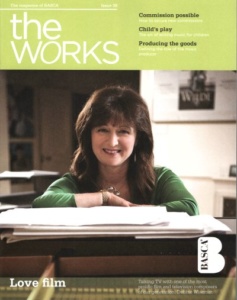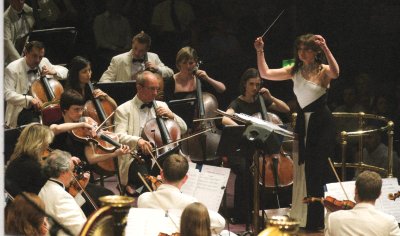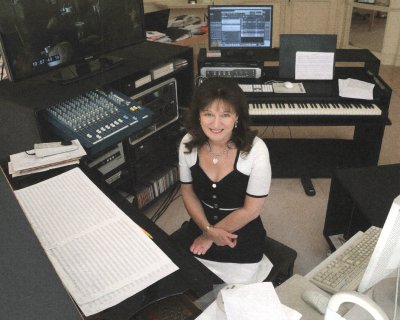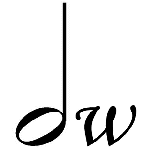In print – The Works
Guy Dammann meets one of the most prolific film and television composers of our generation: Debbie Wiseman
(Published in The Works, November 2013)
 Even if you haven’t heard of Debbie Wiseman, the chances are you will have heard her music. One of the most prolific film and television composers of her generation, Wiseman’s list of credits is akin to the toy bunny which famously advertises a certain brand of battery, it just keeps going on and on. Covering bench-mark documentaries such as Death of Yugoslavia and The Second Russian Revolution, Wiseman has composed the music for a huge variety of television and film hits, including The Inspector Lynley Mysteries, Judge John Deed, Tom and Viv, Arsene Lupin and 2009’s surprising madcap macabre comedy, Lesbian Vampire Killers.
Even if you haven’t heard of Debbie Wiseman, the chances are you will have heard her music. One of the most prolific film and television composers of her generation, Wiseman’s list of credits is akin to the toy bunny which famously advertises a certain brand of battery, it just keeps going on and on. Covering bench-mark documentaries such as Death of Yugoslavia and The Second Russian Revolution, Wiseman has composed the music for a huge variety of television and film hits, including The Inspector Lynley Mysteries, Judge John Deed, Tom and Viv, Arsene Lupin and 2009’s surprising madcap macabre comedy, Lesbian Vampire Killers.
Then again, the chances are that you will have heard of Debbie Wiseman. A prominent spokesperson for composers and musicians, Wiseman makes frequent appearances on national radio and television herself. If she’s not being roped into discussing plans to revamp the National Anthem on BBC Radio 4 or simply to discuss her latest project, she’s often thought of as the go-to contact for discussions on the modern art and craft of composing for the screen.
An inspiring speaker, Wiseman’s high profile reflects something of a sea-change in the way screen composers are thought of by the wider public. Formerly an invisible cog in the complex machinery whose mysterious whirring is responsible for turning a silent script into a finished piece of film or television, composers were typically heard but not seen. But not any more.
“Music is the one element of a film that often just goes straight to the heart,” Debbie Wiseman says when I track her down in a secluded corner of the bustling members bar at BAFTA. “The music in a film can often forge an instant emotional connection with the viewer and so is one of the most important things when it comes to telling stories in pictures and sound. But what’s wonderful now is that it’s increasingly being considered as an art form in itself, talked about more and with more time spent listening to it.”
One of the main reasons Wiseman is so well placed to be at the centre of this new focus on composers is that she has instinctively never been content with being an unseen figure in the background. This is certainly true when it comes to the performance of her music, which she always conducts herself, often featuring in the RPO’s Filrnharmonic series or in other concerts that she programmes herself. But in conversation it’s clear that Wiseman’s non-composing activities are not just about putting her own music on a wider platform, but reflect an irrepressible need to be among musicians and to draw her creative energy from working with them. There’s also a spark, much more familiar to concert composers than their screen counterparts, that comes from making a connection with a live audience through music-making.

Debbie conducting the Royal Philharmonic Orchestra at the Royal Albert Hall
“Making live music is something that’s always been important to me, and I love the way you can feel the audience’s presence right there and then. There’s also a particular kind of excitement that comes from working live with other musicians. I’ve never been one of those composers who’s content just to put the notes on the page and let the “musicians” take care of the rest. In the studio, too, my job as a composer is never finished until everyone’s agreed and the recordings have been signed off – until that moment, when the orchestra’s gone home, everything is still up for discussion.”
Just as much as the irrepressible creative energy that bubbles up from Wiseman, it is this collaborative spirit that explains her success in her chosen field, something which is confirmed when she describes her creative process. “Quite often the composer only comes on board a project at the end, but the ideal is when you get to start with the script and begin sketching at the piano before seeing a few scenes on set.”
If this makes Wiseman out to be a kind of slow-burn artist, then that’s misleading for she’s one of the fastest workers on the scene. Indeed, as she explains, it’s partly the tight deadlines with composing for screen, and the fact that things may change at any moment and require you to start afresh, that make working in this field exciting.
“Sometimes you’ve got just 3-4 weeks for the whole project, with an orchestra already booked to make the deadline really frightening, and even then people will change things on the way. If you’re the sort of composer who needs to take their time and ponder things, it’s probably not for you. What’s really important is never to let someone down. If you don’t deliver, you might as well give up because it’s a small industry.”
One senses Wiseman, who is a visiting professor at London’s Royal College of Music, is used to giving advice to her younger colleagues, and part of this comes from her gratitude to her own student days at the Guildhall School of Music and Drama, where the unique marriage of music and theatre helped her to move in the direction in which she wanted to go. She studied piano there with James Gibb and composition with Buxton Orr, one of the most versatile composers of the post-war generation, equally adept at writing hard-core serialist concert pieces as lighthearted, virtuoso variations on the themes of the great operas. He was also an experienced composer for film. Even so, like her fellow- students, much of Wiseman’s focus was on writing concert music in line with the late-20th century avant-garde.
“Messiaen was my big love at the time. The way his music paints pictures for the mind is just amazing. But in the end I could never get away from the desire to work with themes and melodies, and also just to get out there and work rather than squirrelling myself away and writing only concert hall music.”
Professional success didn’t come immediately, and Wiseman spent two years playing weddings before one of the hundreds of demo tapes she sent out finally received a response from a director working on a documentary about the miners’ strike.
“One of the choral pieces on my demo really struck a chord, and he thought he should use choral music on the film. It went well and, after doing a few more films for the same production company, I went in no time from being a novice to a composer with a bunch of actual credits. That’s really what makes the difference when you are starting out.”
One of Wiseman’s big breaks came with the 1994 biopic about TS Eliot and his first wife, Tom and Viv, working for the first time with the director Brian Gilbert. As well as being a pivotal point in her career – it was Wiseman’s first feature film – it was also an important learning experience for her.
l was quite nervous for once and had over-prepared, with 20 minutes of music mocked up even before meeting Brian. He rejected three quarters of it. In the end I realised it worked much better when I played him sketches on the piano. The ideas come across more cleanly when they are stripped down. lt’s lucky it worked out because it was Brian who asked me back to work on Wilde, with Stephen Fry, and my collaborations with Fry have now taken on a life of their own.”
Although the move into film seemed a big deal to Wiseman at the time, things are different now she says. “The best directors now work across both mediums, and television often has the best budgets. TV can be a great opportunity for composers because there’s much more screen time to fill. The difference really has more to do with how you approach the different formats.
“Just now, Wiseman is working on three projects: A Poet in New York, a film about the final weeks in the life of Dylan Thomas starring Tom Hollander; The Whale, a BBC drama about the true- life story of Moby Dick starring Martin Sheen; and a 10-part BBC series based on GK. Chesterton’s Father Brown novels. The projects are very different, she says, not merely because of the quirkier style of Father Brown and the rather darker drama inherent in A Poet In New York, but also in the way the music gets written.
“With the Dylan Thomas project, l actually worked on 10 different themes for the main cue, eventually deciding the right one with the director. With a television series, though, it’s more about what you do with the basic material because you have to give the series an identity. With my main ‘sleuthing theme’, as l call it, for Father Brown, I have to find dozens of different ways to rework it so the audience doesn’t get fed up. After all, 10 hours of television drama requires a lot of music.”

Debbie Wiseman in her studio
Wiseman is also increasingly busy these days with her own projects, especially after she signed a contract with Warner Classics for her settings of Wilde’s Fairy Tales, narrated by Fry and Miranda Richardson, and the release last year of her first solo album, Piano Stories. Last year also saw Wiseman invited to contribute to the New Water Music, one of the flagship music events in the Queens Diamond Jubilee pageant.
“The atmosphere was unbelievable. Two million people waving and smiling in the rain from the river bank. We all got totally drenched, but unlike in the studio, where musicians are famously finicky about the temperature, everyone just kept on at it. The amazing thing, though, is that the Queen was there, standing up for the whole two or three hours. I felt pretty brave conducting in the rain for my six-minute slot, but there she was throughout. Now there’s a woman who really knows how to see something through.”
Wiseman smiles at the memory. It resonates, clearly because if there’s one quality that has got Wiseman where she is today, it’s the ability to see something through.

